ABV: 4.5, 6.4 and 7.2%
Origin: San Francisco, California, USA
Website: http://thirstybear.com
Northern California’s Bay Area is indisputably the birthplace of the modern US craft brewing movement, whether you date it from Fritz Maytag buying and reviving San Francisco’s historic Anchor brewery in 1965 or Jack McAuliffe founding the first US microbrewery of the modern era, New Albion, in Sonoma in 1976. Inspired in part by the atmosphere of nonconformism and experimentation that the principal city and its outlying region has nurtured since at least the 1950s beat scene, when Kerouac and Ginsberg hung out at Lawrence Ferlinghetti’s North Beach bookstore City Lights, Bay Area brewers have moved in all kinds of weird and wonderful directions – think of Drakes, Lagunitas, Moonlight, Moylans, Napa Smith or Russian River.
Compared to that lot, often overlooked San Francisco brewpub ThirstyBear seems, well, more grounded – but the quality and the ambition are just as keen as among the purveyors of three-figure IBUs and menageries of wild yeast. It’s a stylish place in the City’s SoMa neighbourhood – so named as it’s south of the diagonal axis of Market Street.
The area was formerly, and remains partly, industrial, with a reputation that dates back at least to the beginning of the last century of catering to itinerant workers and the homeless — still a disturbingly common sight on the city’s streets for all its liberal values and prosperity. Today’s SoMa is a slightly edgy mix that includes major cultural institutions like the San Francisco Museum of Modern Art and the Yerba Buena Center, galleries and craft shops, the Moscone Center with its high tech trade shows, the cruisier side of the local gay scene along Folsom Street and a world class beer shop, City Beer Store.
The brewpub’s founder, former immigration lawyer and all round bundle of energy Ron Silberstein, conceived the place as a way of combining two of his passions when he opened it in 1996 – a home brewing hobby he’d acquired as a student in Massachusetts in 1978, and a love of Spanish food, especially tapas, that developed during a two year sojourn in Madrid in the 1980s. As brewpubs boomed in the 1990s, Ron chucked in his job and joined the first cohort on the American Brewers Guild’s Intensive Brewing Science and Engineering Diploma.
As well as all the other aspects of running the business, Ron did all the brewing in the early days and developed many of the core recipes. But trade grew and pressure on time increased, and in 2002 he took on a full time brewer, the garrulous Brendan Dobel, another former home brewer who served his professional apprenticeship at Tabernash in Colorado (since absorbed by Left Hand). Brendan then trained at the Doemens-Akademie in Munich, and worked at the Fässla brewery and the famous Weyermann maltings in Bamberg before returning to his native California determined to brew German-style beers. Which he still does to an extent, and the influence is clear, but it’s not the overarching theme of the Bear.
The original concept was to give equal weight to food and beer and food remains a strong part of the offer. The place has a claim on being the first authentic contemporary Spanish restaurant in the USA and includes on its menu well cooked version of traditional staples like paella (including one with locally foraged wild mushrooms), pescaditos fritos, empanadas de polla and membrillo. But there are also burgers, bar snacks and Californian artisanal cheeses, and you’re welcome to pop in just for a drink at the bar. Despite the “Please wait to be seated” sentry at the door, the contemporarily styled, split level quasi-industrial space with its long tables, bare brick and bullfight posters still has the sociable, bustling feel of a bar more than a restaurant.
Brewing takes place in the extensive basement but the tall conico-cylindrical fermenting vessels tower impressively, penetrating through to the public space. The design is as it was on first opening and Ron says he would do things differently now, as some of the kit is hard to access and the layout doesn’t make the best of the brewhouse as a feature of interest for customers, but it’s certainly capable of producing some very decent beer. In the grain store I spotted supplies from Brendan’s former employer Weyermann, Gambrinus in British Columbia and from Crisp in the UK, but the brewery also makes use of more local supplies – it has brewed beers made entirely from California-grown malt and hops. All the ingredients are organic – it is the first and so far the only San Francisco brewery certified by the state accreditation body CCOF.
The name, incidentally, has nothing to do with the bear on the California state flag but is taken from a headline in the San Francisco Chronicle which caught Ron’s eye in 1991, “Thirsty bear bites man’s hand for beer”, recounting an incident in the Ukraine when an escaped circus bear had attacked an unfortunate drinker, one Viktor Kozlov, and took his beer. The victim is commemorated in the regular stout, Kozlov Stout. This is one of seven regular brews that also include a pils, a brown ale that aims at a British rather than a contemporary US style, an IPA and a Belgian-style wheat beer. All are unpasteurised and usually served from kegs and bright tanks, with the stout and ESB dispensed nitrokeg style, but the brewery also experiments with wood ageing and usually offers at least one cask beer, sometimes a cask version of a regular.
Taster fights with small glasses of all the available beers are sold, and I worked my way round one, picking out a few to write about in more detail. ThirstyBear’s brews aren’t “extreme” beers – they’re by and large very flavoursome and well made, but also approachable, balanced and not too assertive, very much reflecting the original intention of creating quality beers to match with food. Well worth seeking out, even if you don’t have a bear-sized thirst.
Golden Vanilla is the lowest gravity of the regular brews and one of the pub’s most popular lines, a delicate golden ale, shading on light amber, that’s infused during conditioning with whole organic vanilla pods. Vanilla is obvious on the aroma and also on the palate, giving a cream soda note but remaining dry rather than sweet, with some tangy fruit and biscuity malt. The shortish finish develops very gentle hop notes – the beer is only rated at 15 IBUs. This is a light hearted, easy quaffing beer with a subtle twist and you can see why they get through so much of it.
Meyer ESB is ThirstyBear’s entry in the extensive ranks of US craft beers honouring England’s, and more specifically Fuller’s, Extra Special Bitter style. Like many other examples it’s a bit stronger than the original at 6.4%. It’s fermented with Wyeast’s ‘1968’ classic British ale yeast strain and is habitually served stout-style using nitrogen but occasionally pops up in cask.
My sample was a rich amber with a fine, dense yellowy-beige head and an aroma of fruit, malt and cream. The palate was big but very smooth and rounded, with that sweet-dry ambiguity I find characteristic of the original. Again there was fine biscuity malt, with some slightly stewed, earthy hop flavours coming through – the bitterness is rated at 30 IBU. A coating and very moreish finish had a light but not overbearing bite of hops. Overall this was my favourite of the beers I tried.
There are regularly changing seasonals and specials and when I called they were serving Ryeison, a saison-style beer made with rye. This came about as a result of one of those homebrew competitions where the prize is to have your beer made by a professional brewery. It was a golden beer with a bit of white head. A fruity and notably soured aroma heralded a soft but complex palate, with typical oily and spicy rye flavours, aromatic orange notes, some gritty malt and a hint of vanilla. A sweetish, fruity finish dried to leave tangy orange marmalade and herbal flavours.

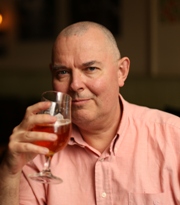
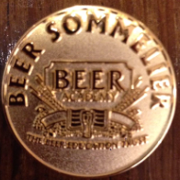
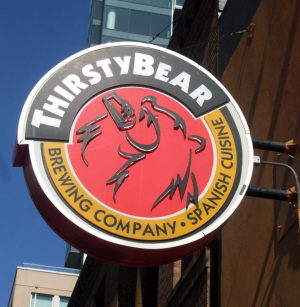

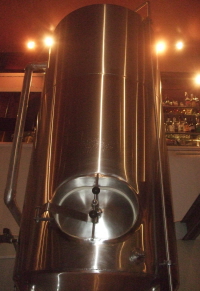
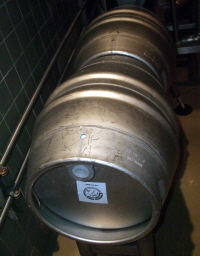

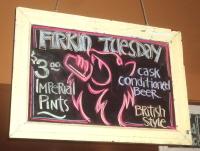
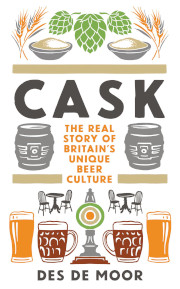
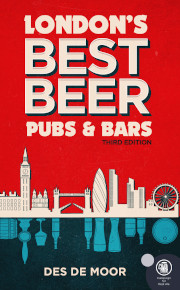
Leave a Reply